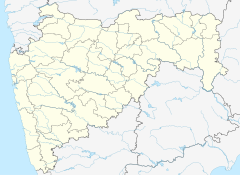Lenyadri
| Lenyadri | |
|---|---|

Interior of Ganesha temple cave
|
|
| Name | |
| Proper name | Shri Girijatmaj, Lenyadri |
| Geography | |
| Coordinates | 19°14′34″N 73°53′8″E / 19.24278°N 73.88556°ECoordinates: 19°14′34″N 73°53′8″E / 19.24278°N 73.88556°E |
| Country | India |
| State | Maharashtra |
| District | Pune District |
| Locale | Lenyadri caves near Junnar |
| Culture | |
| Primary deity | Ganesha as Girijatmaja |
| Important festivals | Ganesh Chaturthi and Ganesh Jayanti |
| Architecture | |
| Architectural styles | Buddhist vihara cave |
| History and governance | |
| Date built | the vihara dates to the 1st century AD, date of conversion to temple: unknown |
Lenyadri (Marathi: लेण्याद्री, Leṇyādri) represents a series of about 30 rock-cut Buddhist caves, located near Junnar in Pune district in the Indian state of Maharashtra. Cave 7 is a famous Hindu temple dedicated to the god Ganesha. It is one of the Ashtavinayak shrines, a set of the eight prominent Ganesha shrines in Western Maharashtra.
Twenty-six of the caves are individually numbered. The caves face to the south and are numbered serially from east to west. Caves 6 and 14 are chaitya-grihas (chapels), while the rest are viharas (dwellings for monks). The latter are in the form of dwellings and cells. There are also several rock-cut water cisterns; two of them have inscriptions. The layout of the caves, in general, are similar in pattern and shape. They generally have one or two sides with two long benches for occupants' use.
The caves date from between the 1st and 3rd century AD; the Ganesha shrine situated in Cave 7 is dated to the 1st century AD, though the date of conversion to a Hindu shrine is unknown. All of the caves arise from Hinayana Buddhism.
The current name "Lenyadri" literally means "mountain cave". It is derived from 'Lena' in Marathi meaning "cave" and 'adri' in Sanskrit meaning "mountain" or "stone". The name "Lenyadri" appears in the Hindu scripture Ganesha Purana as well as in a Sthala Purana, in association to the Ganesha legend. It is also called Jeernapur and Lekhan parvat ("Lekhan mountain").
The hill is also known as Suleman Pahar ("Suleman hill") or Ganesh Pahar ("Ganesha hill"). An ancient inscription calls the place Kapichita (Kapichitta). The caves are also known as Ganesh Lena or Ganesh Caves.
Lenyadri is located at 19°14′34″N 73°53′8″E / 19.24278°N 73.88556°E, in the Indian state of Maharashtra in Pune district. Lenyadri is a deserted location, with no human settlement nearby. It is located at about 3 miles (4.8 km) from Junnar, the headquarters of Junnar taluka. It is situated on the north-west banks of river Kukadi, which flows between Golegaon and Junnar. It is also approached through Nanaghat, which was originally on the trade route between Aparantaka or the northern Konkan and the Deccan and descending to the plains of the Junnar town, dated to about 100 years before Christ was born. The circular hill, where Lenyadri caves have been emboweled, raises about 100 ft above the plains in the Hatkeshwar and Suleiman ranges.
...
Wikipedia

